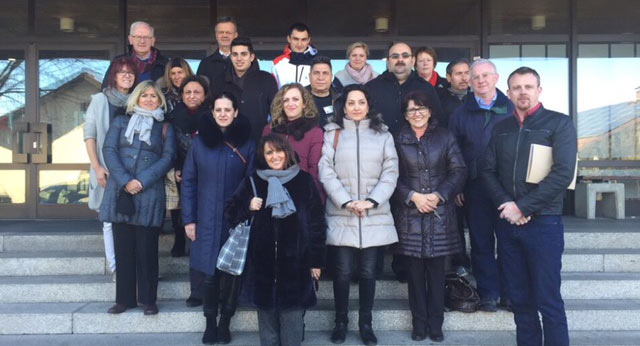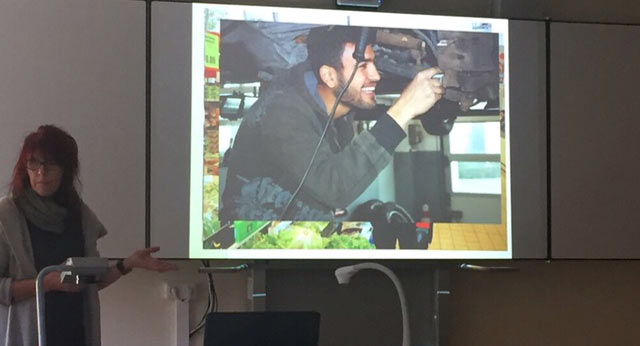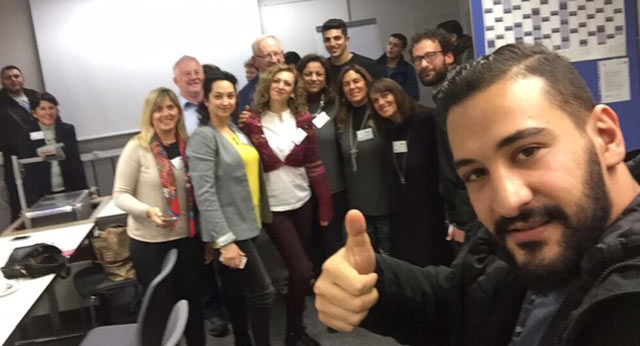The first phase of the Erasmus+ KA2 “Educational Integration of Refugees – A Classroom Approach” project was to create a dialogue with refugees in each of the project partner countries and in particular to listen to the experiences, concerns, fears and hopes of refugee students and the educational staff who work with them. This objective was to be achieved in two main ways. Firstly through the creation and analysis of a questionnaire to be completed by refugees in each partner country (Appendic 1) and secondly through a teacher training activity where direct contact would be made with refugees and those who work with them.
The teacher training activity took place in Regen, Germany from Sunday, 27th November – Saturday, 03rdof December. Regen was selected as the venue for this activity due to the fact that the region has become home to a very large number of refugees in recent years and our partner organisation there, Volkshochschule ARBERLAND, is directly involved in providing integration and training courses for many of these refugees. In addition the relatively compact size of Regen made it possible to visit all of the stakeholders involved in the German refugee process, from initial registration, through integration courses and into the workplace,
Visits to and meeting with the following stakeholders took place:
- Professional Career Activation Courses
- Language Integration Course
- Meeting with Volunteers
- Secondary School
- Vocational School
- Visit to an Employer
- Meeting with unaccompanied minor refugees.
- BAMF / Federal Office for Migration and Refugees
- Meeting and discussion with all authorities: head of district, Jobcentre, Labour office, and network manager for refugees
The meeting with BAMF provided participants with a very clear understanding of the German refugee process and provided a framework through which the other meetings could be viewed. There are seven main stages in the German asylum procedure:
- Arrival and Registration in Germany
- Initial distribution among the Federal Länder
- Reporting to and accommodation in the competent reception facility
- Personal application to the Federal office
- Examination of the Dublin procedure
- Personal interview at the Federal office
- Possibility for decision making in the national asylum procedure
This procedure can lead to the following possible outcomes:
- Acknowledgement of entitlement to asylum
- Award of refugee protection
- Award of subsidiary protection
- Imposition of a ban on deportation
- Outright rejection – with a notice to leave the country
- Rejection as “manifestly unfounded” – with a notice to leave the country
There is also an appeals procedure against the decision of the Federal Office in place.
Participants at the training activity witnessed first hand the main stages of this process, this included seeing the registration and interview process, visiting the refuge accommodation at the initial reception facility, talking to staff who conduct the interviews, meeting staff who check for forged papers etc.
The meetings at the career activation course, the language integration course, the vocational school and secondary school allowed the participants to talk directly with refugee students and their teachers about the difficulties and positive aspect of their educational experience. As would be expected the importance of language learning came very much to the fore as a key step in accessing the other educational opportunities available and ultimately accessing the employment market. Some students did express concern that their own culture could be diluted by the process. One man pointed out that many customs that we in the west see as religious are in fact cultural and that this fact is not fully appreciated. Another an told us that his wife and family were due to arrive the next day. He explained that he had been forced to let them behind in Syria close to two years ago and it is not difficult to understand his impatience to be reunited with his family. Many of the adult refugees we spoke to had a reasonable level of English but very few had any knowledge of the German language prior to arrival in the country.
In the secondary school the importance of having a native Arabic speaker on staff both as a translator and support for the students was very evident. Many of the refuges have been through horrific experiences and the process of recovery from such trauma can be a long one and requires good support services.
For many of the training activity participants the meeting with refugees who arrived in Germany alone as minors was perhaps the most emotional encounter. These students were aged between thirteen and seventeen and came from a wide range of countries including Syria, Afghanistan, Eritrea and Sudan. One fifteen year old Afghan told us how his father had given him $300 and sent him on the journey to Europe crossing Iran and Turkey on foot and by public transport, then on a small boat to Lesbos in Greece, eventually reaching the mainland then through Macedonia, Hungary, Austria ad Germany. Another Afghan spoke of how he let home with his father when he was twelve, how they both worked in Iran for three years to make money to continue the journey and how his father sent him on alone once enough money for one journey had been raised. Another fifteen year old student told us how his only relative in Germany was his cousin, but he had turned eighteen a few week previous o our visit and had been deported. There were many similar stories.
During this visit we had dinner with the refugees in their boarding school and went to see their rooms. We took note that the students were allowed to decorate their rooms themselves, which of course helped to make the accommodation feel less institutionalised. Some had maps of their country on the corridors with their place of origin marked, others had country flags on their walls, some had created wall murals which showed clear artistic talent. One student had written “Allah is the greatest” across his room door. This last statement helps to highlight the need to provide religious education for young refugee students and indeed we were informed that the German government is planning to introduce Islam into the schools. Clearly this is desirable as it would give young Islamic refugees a focus for and recognition of their religious beliefs and could be an important step in counteracting extremism.
We did note that many of the refugees had good contact with home and within their own networks through social media, whatsapp, viber etc.
Another interesting meeting was with the volunteers who give time freely to help refugees integrate into German society. Such help can be as simple as showing a refugee how to buy a bus ticket or use an ATM machine, how to manage household bills, assist with completion of forms or simply provide a sympathetic ear where support is needed. Many of these volunteers are retired people and interesting some had become involved in this type of work during the Bosnian refugee crisis. This of course means that there is quite a wealth of experience within these volunteer organisations.
A visit to an employer also gave us the opportunity to meet with a refuge who is now engaged as an apprentice. There is a clear plan in Germany that most refugees will be integrated and ready to join the workforce within five years of their arrival in the country. The meeting and discussion with local authorities: head of district, Jobcentre, Labour office, and network manager for refugees allowed us to see how the different agencies work together to achieve the necessary level of refugee integration and education to achieve this goal.



